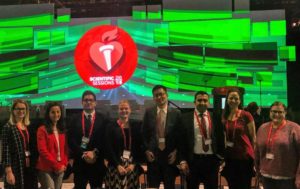What is the value of traveling to a large cardiovascular meeting, when the information communicated in the sessions will be available via Live Streaming and the major news will be published immediately? Why go through the expense and the hassle of time away from work? Attending an event like Scientific Sessions is not easy for most of us — especially Early Career professionals who experience high demands on our time and limitations on our resources. So what makes it worthwhile? Of course this depends on your career type and your goals, but I believe the following three reasons are important for everyone in academia:
- Hearing and learning things you would not have sought out. When you’re at a professional conference, you have set aside time for learning. You are less likely to be squeezing learning in between other tightly scheduled commitments at home. This time allows for serendipitous exposure to new areas. For example, even though my research focuses on symptoms, risk, and communication, I heard some very interesting sessions about the microbiome. Similarly, this kind of broad exposure enables cross-pollination among disciplines that share common goals but diverse methods. What can basic scientists learn from nurses? What can interventional cardiologists learn from computer programmers?
- Personal connections. The power of small interactions— a chat in the coffee line, a well-put question during a session— is undeniable. The opportunity to make such connections with people at all levels in your field and related fields is one of the major benefits of attending a conference. Certainly this includes people who are “big names,” but also people whose work you might now take an interest in since you’ve met them (and vice versa). When I attended a 10-day seminar in Tahoe last year, I sat around the campfire with Dr. David Goff, director of an NIH division, and I was also the roommate of Dr. Sherry-Ann Brown, a junior scientist whose work I’ve since cited. I was able to reconnect with them and other old connections from the seminar at Scientific Sessions this year, and was genuinely interested in their work on a new level because I knew them.
- Momentum and enthusiasm. I always come home from events like this brimming with ideas. Science is a highly creative endeavor, and anything that sparks creativity is good for science. To make the most of this aspect, I keep good notes and make a priority list, including names, references, and contact information if applicable. I review my list on the plane ride home and identify “action items” for follow up. An event like Scientific Sessions also gives you a great feel for the overall state of cardiovascular research, and for the current priorities of different stakeholders. Using this information in long-range planning is smart and increases changes of successful projects going forward.
While it’s not feasible to attend every event that interests you, I highly recommend making an event like Scientific Sessions a priority, especially early in your career.
Why do you go to Scientific Sessions?

AHA Early Career Bloggers had the opportunity to get to know one another during Scientific Sessions 2018